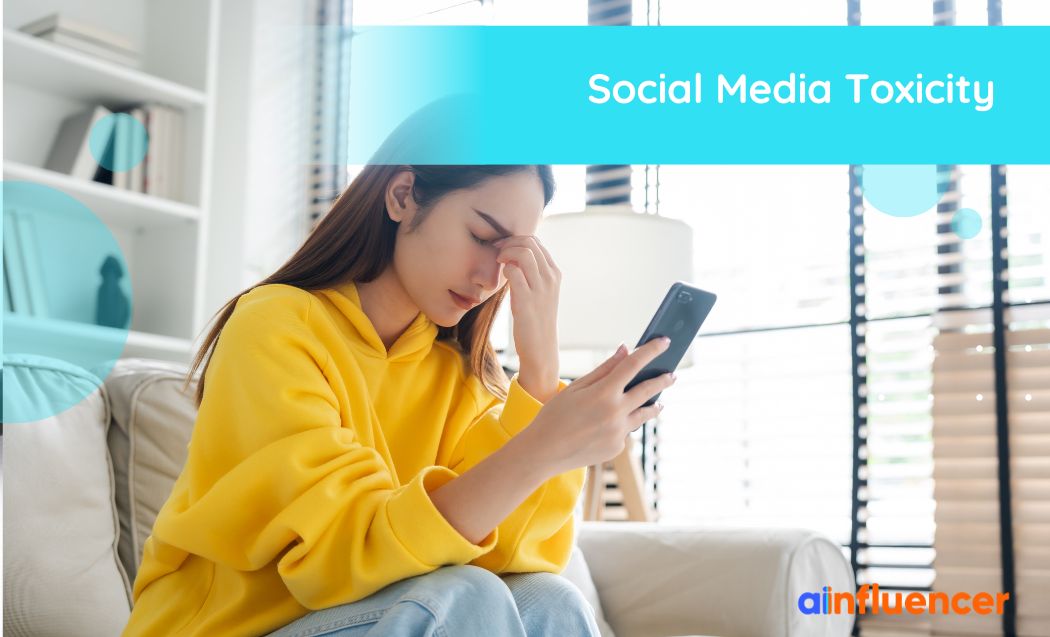In the digital age, social media has become an integral part of our daily lives, offering a platform for connection and information at our fingertips. However, behind the glossy filters and curated feeds lies a darker side of social media toxicity that can take a toll on our mental well-being.
The constant comparison, cyberbullying, and FOMO (fear of missing out) culture prevalent on social media platforms can lead to feelings of inadequacy, anxiety, and even depression.
In this guide, we’ll explore effective strategies to help you maintain your mental health while navigating the complexities of social media platfroms. Without further ado, let’s start!
What Is Social Media Toxicity
Social media toxicity refers to the negative, harmful, or unhealthy behaviors and interactions that occur on social media platforms. This toxicity can manifest in various forms, including cyberbullying, harassment, hate speech, trolling, spreading misinformation, and cancel culture.
Social media toxicity can have serious consequences for individuals’ mental health and well-being, as well as for society as a whole. It can contribute to increased stress, anxiety, depression, and feelings of isolation among users.
Additionally, it can fuel polarization, deepen societal divisions, and erode trust in online communities.
Tips to Protect Your Mental Health from Social Media Toxicity
Social media can be a double-edged sword, offering both connection and challenges to our mental well-being. That’s why it’s crucial to develop strategies to protect our mental health from its potentially harmful effects.
To stay mentally healthy while using social media, as mentioned in CyberGhost’s blog piece, it’s essential to set boundaries and moderate your usage.
Consider limiting your screen time, taking breaks from social media, and unfollowing accounts on TikTok, Instagram, and other social media platforms that make you feel bad about yourself. Engage in activities that promote mindfulness and relaxation, such as meditation or exercise.
Here are some additional tips to protect your well-being from social media toxicity:
#1 Engaging in Brief
Intentional social media sessions each day can be more beneficial than spending extended periods mindlessly scrolling through feeds. Setting a limit on your screen time and avoiding late-night use can help prevent exhaustion and improve overall well-being. Being selective about the content you engage with can also have a positive impact on your mood and mental health.
Consider setting specific times for social media usage to create a healthier relationship with technology. Prioritizing real-life interactions and hobbies over virtual connections can lead to greater satisfaction and fulfillment in daily life.
#2 Beware of Addiction
Social media addiction can have serious consequences on mental health and overall well-being. It’s crucial to recognize the signs early on and take steps to address them. Strategies for overcoming social media addiction include setting usage limits, engaging in offline activities, and seeking support from friends or professionals if needed.
Common symptoms of social media addiction include constantly checking notifications, feeling anxious when unable to access social media, and neglecting real-life responsibilities.
#3 Be Active rather than Passive
Research suggests that individuals who use social media actively by posting their content and interacting with others online tend to report feeling more positive and connected.
By engaging in conversations, sharing personal updates, and receiving feedback, active users experience greater satisfaction than those who passively scroll through their feeds.
Additionally, focusing on interacting with people whom you know offline can enhance the quality of your online interactions, building stronger relationships both online and in real life.
#4 Engaging in Self-care Practices
Engaging in self-care practices such as setting boundaries with online content, taking regular breaks from screens, and curating a positive feed can help maintain a healthy relationship with social media.
Prioritizing real-life interactions, practicing mindfulness, and being mindful of your emotions while scrolling through feeds can also make a significant difference.
It’s essential to remember that social media is a curated version of reality and not compare yourself to others online.
#5 Don’t Let It Replace Real Life
Engaging in conversations with friends on social media platforms like Twitter can be enjoyable, but it is important to remember that these interactions should not completely replace real-life conversations.
While online communication has its benefits, nothing can truly replicate the feeling of sitting across from someone and engaging in a face-to-face conversation. The physical presence of another person helps fulfill our innate human need for connection and belonging.
#6 Cultivating Positive Relationships Offline
In the age of social media toxicity, it is important to prioritize mental health by cultivating positive relationships offline. Make time for face-to-face interactions with friends and family members to strengthen connections and promote emotional well-being.
Engage in activities that bring you joy and fulfillment, such as hobbies or exercise, to maintain a healthy mindset. Limit your exposure to negative content on social media by unfollowing accounts that contribute to feelings of inadequacy or stress.
Conclusion
While social media offers numerous benefits, it also presents challenges to our mental well-being. By implementing the strategies outlined in this guide, you can protect your mental health.
Remember to set boundaries, moderate your usage, and prioritize real-life interactions over virtual connections. Be mindful of the content you consume and engage with, and actively seek out positive relationships both online and offline. Cultivate self-awareness and practice self-care regularly to maintain a healthy relationship with social media.
With mindfulness and intentionality, you can thrive on social media platfroms without succumbing to social media toxicity!
FAQs
Signs of social media addiction include constantly checking notifications, feeling anxious when unable to access social media, neglecting real-life responsibilities, and spending excessive amounts of time on social media platforms.
Dealing with social media toxicity means finding ways to handle the negative stuff you might come across online. One way to do this is by setting limits on how much time you spend on social media. It’s good to take breaks from it now and then. You can also choose to follow accounts that make you feel good, and unfollow ones that don’t.
Taking care of yourself is important too. This means doing things like meditating, exercising, or spending time away from screens. Pay attention to how social media makes you feel. If it’s making you stressed or upset, it might be time to step back for a bit.
You can also learn more about how social media affects mental health. Understanding this can make it easier to navigate the online world in a healthy way.

![Read more about the article 8 Business Plan Examples: [Roadmap to Succeed in 2024]](https://blog.ainfluencer.com/wp-content/uploads/2023/12/Business-plan-examples-featured-1-300x182.jpg)
![Read more about the article The Growth of Affiliate Marketing [2024 Update]](https://blog.ainfluencer.com/wp-content/uploads/2024/05/The-Growth-of-Affiliate-Marketing-2024-Update-300x182.jpg)




![Read more about the article How to Become a Fashion Nova Ambassador: [The Ultimate Guide + Best Alternative in 2024]](https://blog.ainfluencer.com/wp-content/uploads/2023/12/Fashion-Nova-ambassador-featured-1-300x182.jpg)

![Read more about the article What Is Ghost Commerce? [A Comprehensive Review in 2024]](https://blog.ainfluencer.com/wp-content/uploads/2024/03/ghost-commerce-featured-300x182.jpg)